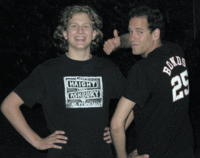I’ve spent the past three nights in Zurich, Switzerland. It feels like home — I was here for three weeks last summer.
When I arrived at the Zurich train station I first had to withdraw Swiss Francs, since they’re too special to be on the Euro, and then sought out some flowers. I hadn’t seen my host brother, his sister, or his parents in a year. I had already given them some San Francisco gear last summer. I purchased a single rose for 6.50 francs. I have to say it felt more awkward just handing a rose as opposed to a bouquet, but it worked out since she put the rose in with some other plants in a pot on the dining room table.
The City of Zurich hasn’t changed a bit. Still beautiful, still distinct. All my Swiss friends haven’t changed at all either. Nor has the house I stayed in changed. In short: nothing has changed. This made for a good time. Only for these three days am I truly familiar with my surroundings, familiar with what makes the Swiss tick, knowledabe of all the public transit offerings. The rest of my journey is more fumbling.
During my first full day I woke up late, took advantage of my family’s blazing wi-fi, and feasted in the morning light pouring through the French windows. Then I headed downtown and re-traced a route I did often last summer. I bought the Financial Times — which has really impressed me the past couple weeks — and settled in on a bench in a park near the main train station where I had taken German lessons. Soon the sun turned to clouds and clouds turned to showers. Caught without my umbrella, I started looking for shelter. None of the locals moved, however. I should have taken this as a sign: the showers cleared and sun and heat re-appeared within 15 minutes.
A lazy few hours in the park did the job for me. I hopped back on the tram, came home, rode the stationary bike, rowed, stretched, did crunches, showered, and spent another couple hours catching up on stuff online. Then dinner. I love meals here. My host’s mom is an excellent cook. She was out for the night, though, so simply prepared an excellent meal and I dined with my host Patrice, his sister Nadine, and his sister’s ex-boyfriend Massimo. We talked about all that’s happened in past year. We shared a common observation that we’ve all changed quite a bit, but at the same time we haven’t. I totally feel this dichotomy — in the past 12 months I think I’ve grown enormously and had many huge events take place, but I’m still "me." I listen to same type of music, my writing style is more or less the same, I dress the same. Interesting.
The following day I visited the school I attended last summer, had an excellent lunch with my Swiss teenage friends, and shared memories about times of yore. It was during these reminiscent moments when I realized memories rooted in people, not buildings, are immortal. We talked about what we’re doing after high school. The Swiss told me about their required military service, about their higher education choices, about their allegiance to Zurich over Switzerland.
Along the way, I caught a talk by Tyler Cowen. I wasn’t able to hook up with my Microsoft contacts nor a business friend of a friend, nor a school friend. Alas.
Here is me with my Swiss friend and then my host and my friend Massimo sporting their Haight Ashbury t-shirt and Barry Bonds jersey.


